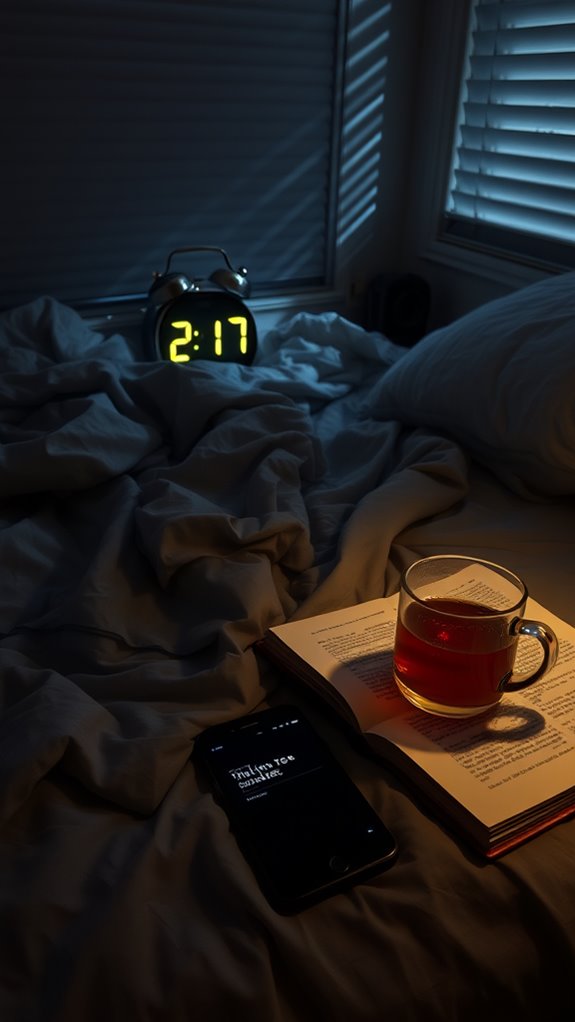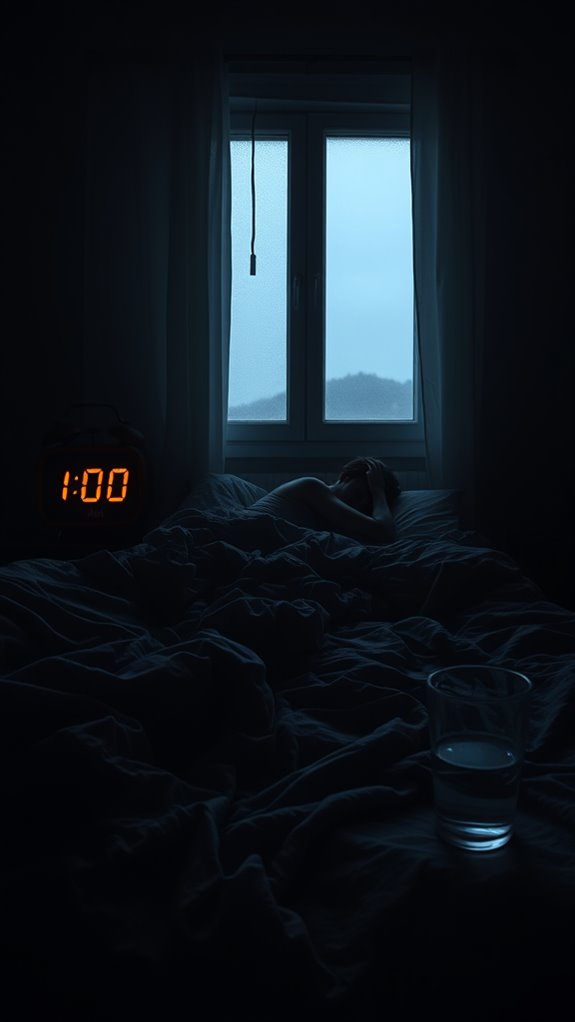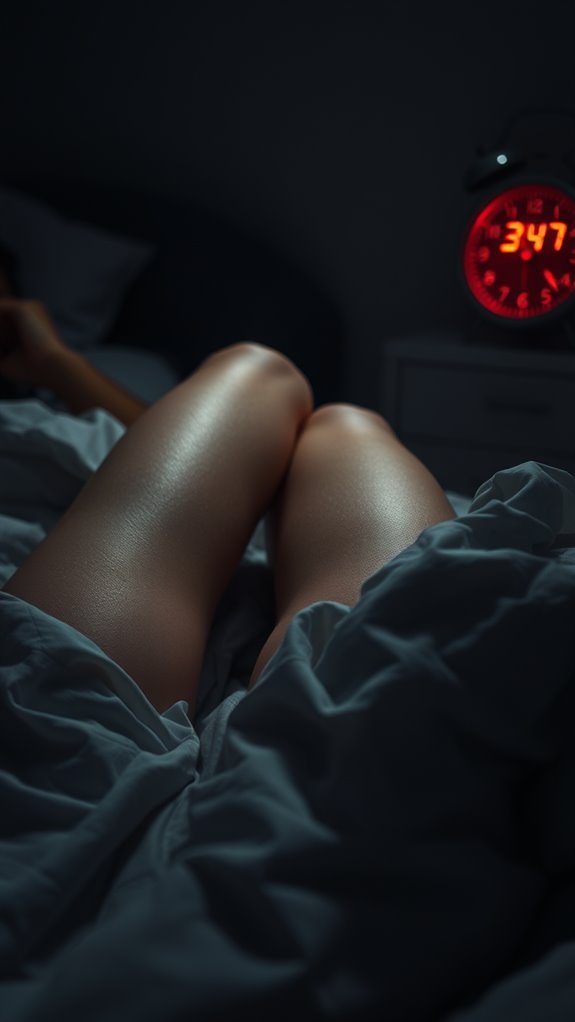
Waking up tired after a full night of sleep can be frustrating and stems from various factors. You might go to bed at the wrong time or have a poor sleeping environment. Sleep apnea could disrupt your rest, while spending more time in bed than necessary often leaves you groggy. Consuming anti-sleep products like caffeine can impact your sleep quality too. By addressing your mental well-being, you can improve your mornings. There’s even more to explore on how to optimize your sleep experience.
Key Takeaways
- Sleep cycle disruptions, like irregular bedtimes and hitting the snooze button, prevent restorative sleep and lead to grogginess.
- Environmental factors such as loud noises, bright lights, and an uncomfortable mattress can significantly impact sleep quality and cause fatigue.
- Health conditions like sleep apnea and anxiety can disrupt sleep cycles, preventing restful sleep and resulting in tiredness upon waking.
- Lifestyle choices, including lack of exercise and poor eating habits, can contribute to low energy levels and decreased sleep quality.
- Morning habits, such as not hydrating or exposing yourself to natural light, may hinder alertness and lead to feelings of tiredness.
Going To Bed At The Wrong Time

When you go to bed at the wrong time, it can throw off your entire sleep cycle.
Going to bed at the wrong time can disrupt your entire sleep cycle.
You might find it hard to fall asleep, disrupt your REM stages, or wake up too early.
All these factors lead to less restorative sleep.
Without quality rest, you’ll likely wake up feeling tired, groggy, and unrefreshed, impacting your daily productivity and mood.
Having A Poor Sleeping Environment
A poor sleeping environment can greatly affect your ability to get quality rest, leading to feelings of tiredness upon waking. Factors like noise, light, and uncomfortable bedding can disrupt your sleep cycle.
| Issue | Impact |
|---|---|
| Loud noises | Constant awakenings |
| Bright lights | Difficulty falling asleep |
| Uncomfortable mattress | Aching body |
| Cluttered space | Increased stress |
Sleep Apnea

Sleep apnea can be a hidden culprit behind your morning fatigue, often going unnoticed until its symptoms become severe.
You might wake up gasping for air or snoring loudly, disrupting your sleep cycle. This condition prevents you from reaching restorative sleep stages, leaving you groggy and tired.
If you suspect sleep apnea, consider talking to a healthcare professional for evaluation and potential treatment options.
Spending More Time Than Necessary In Bed
Although it might seem like spending extra time in bed guarantees better rest, it can actually lead to feeling more tired.
When you linger too long in bed, your body may confuse extra hours with rest, disrupting your sleep cycle. Instead of feeling refreshed, you wake up groggy and lethargic.
Set a consistent wake-up time to promote better sleep quality and energy levels.
Consuming Anti-Sleep Products

When you consume anti-sleep products like caffeine or certain medications, you may unknowingly sabotage your rest.
These substances can disrupt your sleep cycle, making it harder to enter deep sleep stages.
Even if you think you’re fine, the effects linger, leaving you groggy in the morning.
If you want better sleep, consider cutting back on these products, especially in the hours before bedtime.
Having A Snoring Bed Partner
Living with a snoring bed partner can greatly affect your own sleep quality. You might wake up feeling groggy due to constant disruptions.
Here are a few ways it impacts you:
- Difficulty falling back asleep.
- Increased stress from sleep deprivation.
- Reduced overall sleep satisfaction.
Finding solutions, like earplugs or separate sleeping arrangements, may help improve your rest and mood.
Depression And Anxiety

Depression and anxiety can greatly disrupt your sleep, making it hard to feel rested, even after a full night’s rest.
You might find yourself tossing and turning, unable to quiet racing thoughts. Nightmares or excessive worrying can leave you feeling drained each morning.
It’s essential to recognize how these mental health issues impact your sleep quality, potentially leading to persistent fatigue.
Lack Of Exercise
If you don’t make time for exercise, you might find it harder to get quality sleep, leaving you feeling tired in the morning.
Regular physical activity boosts your energy levels and improves sleep quality.
Here are three reasons to get moving:
- Reduces stress and anxiety
- Regulates your sleep-wake cycle
- Improves overall mood
Make exercise a priority for better rest!
Restless Leg Syndrome

While many factors can contribute to feeling tired, Restless Leg Syndrome (RLS) is a common yet often overlooked culprit.
If you experience uncomfortable sensations in your legs at night, it can disrupt your sleep. This constant urge to move can prevent you from reaching deep sleep stages, leaving you feeling exhausted the next day.
Don’t ignore these symptoms; consult a healthcare professional.
Reliance On Sleeping Aids
Many people turn to sleeping aids in hopes of achieving a good night’s rest, but relying on these substances can lead to more problems than solutions.
You might experience:
- Increased tolerance, making them less effective over time.
- Dependence, causing anxiety when you can’t sleep without them.
- Withdrawal symptoms, disrupting your sleep patterns further.
Consider healthier alternatives to improve your sleep quality!
Noise From External Sources
Although you might not realize it, noise from external sources can greatly disrupt your sleep quality. Sounds like traffic, loud neighbors, or late-night parties can prevent you from entering deep sleep stages. To help you identify common noise sources, check out the table below:
| Noise Source | Impact on Sleep |
|---|---|
| Traffic | Disrupts deep sleep |
| Neighbors’ TV | Increases wakefulness |
| Sirens | Causes anxiety |
| Pets | Interrupts cycles |
| Loud Music | Disturbs relaxation |
Having A Poor Eating And Drinking Habit
External noise isn’t the only factor that can leave you waking up tired; your eating and drinking habits play a significant role too.
Poor choices can disrupt your sleep quality. Consider these habits:
- Skipping meals, leading to low energy.
- Consuming heavy or greasy foods before bed.
- Drinking caffeine or alcohol late in the evening.
These can all impact how refreshed you feel in the morning.
How To Stop Feeling Tired After Waking Up
To stop feeling tired after waking up, it’s essential to establish a consistent morning routine that energizes you for the day ahead.
Start your day by stretching or exercising to boost circulation. Incorporate a healthy breakfast to fuel your body, and expose yourself to natural light to signal your brain it’s time to wake up.
These simple steps can greatly improve your morning energy levels.
Try Taking A Glass Of Water After Waking Up
Waking up refreshed can be challenging, but a simple habit like drinking a glass of water first thing in the morning can make a significant difference.
Here’s why you should try it:
- Hydration: Replenishes fluids lost overnight.
- Metabolism Boost: Kickstarts your metabolism for the day ahead.
- Alertness: Increases blood flow and promotes alertness.
Start your day right with this easy routine!
Take Less Coffee
Have you ever noticed how too much coffee can leave you feeling more tired?
While that morning cup can give you a boost, overindulging may lead to energy crashes later.
Caffeine can disrupt your sleep cycle, making it hard to feel rested.
Try cutting back on coffee, especially in the afternoon.
You might wake up feeling more refreshed and ready to tackle the day!
Splash Water On Your Face
When you wake up feeling groggy, splashing water on your face can be an instant refresher.
It wakes you up and revitalizes your senses.
Here are three benefits of this simple trick:
- Increases alertness – The cold water jolts you awake.
- Improves circulation – It boosts blood flow to your skin.
- Enhances mood – A splash of water can brighten your day!
Take A Walk And Spark An Energetic Brain
After splashing water on your face, taking a walk can further boost your energy and mental clarity.
Stepping outside for just a few minutes increases blood flow and oxygen to your brain, helping you feel more awake.
The fresh air and movement stimulate your senses, making it easier to tackle the day ahead.
Leave The Snooze Button Alone
Even though it might be tempting to hit that snooze button for just a few more minutes of sleep, doing so can actually leave you feeling more tired.
Instead, try these strategies:
- Get up immediately when your alarm goes off.
- Place your alarm across the room.
- Establish a consistent wake-up time.
These steps can help you wake up refreshed and ready for the day!
Take Your Mental Health Seriously
While you might focus on physical health, neglecting your mental well-being can lead to waking up exhausted. Stress, anxiety, and depression can disrupt your sleep cycle, leaving you feeling drained. Here’s a quick look at how mental health affects your rest:
| Mental Health Issue | Impact on Sleep |
|---|---|
| Stress | Increases insomnia |
| Anxiety | Causes restless nights |
| Depression | Leads to oversleeping |
| Poor Coping Skills | Reduces sleep quality |
Conclusion
So, you’ve clocked in a full night of sleep, yet you wake up feeling like a zombie? Ironically, it’s often the little things—like that late-night snack or the snooze button—that sabotage your rest. Maybe your bed’s become a cozy trap or your brain’s still on overdrive. Embrace the irony: sometimes, the more you chase restful sleep, the more elusive it becomes. Prioritize your sleep habits, and who knows? You might just wake up feeling like a human again!
